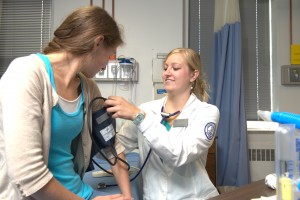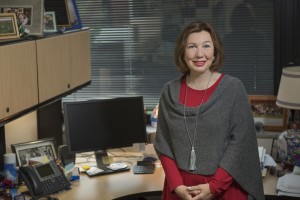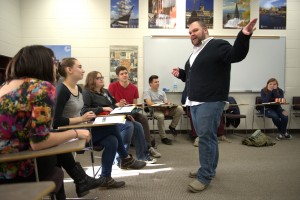
Nursing students train at the UW-Eau Claire bachelor of science in nursing program site in Marshfield.
Good nurses know how to take patients’ blood pressure, do painless blood draws and check vital signs, but the most effective nurses also know how to make those patients feel like people.
For Dr. Cheryl Lapp, a University of Wisconsin-Eau Claire professor of nursing, holistic patient care is at the heart of her teaching. Inspired by research that sites the decline of empathy among nursing and medical students, Lapp created a University Honors Program course to address the issue.
“Empathy Enhancement for Helping Professionals” — offered during the spring semester — uses theater applications, such as script reading by acting students and a theater field trip, to help her students examine and experience empathy in face-to-face human situations that feel authentic, yet do not violate confidentiality.
“I have always tried to infuse empathy in nursing courses,” Lapp said. “And I felt the need to expand that for interdisciplinary students in the Honors program. We as professionals cannot deliver best care practice without having a complete understanding of our patients. The minute empathy is gone, quality of care is gone, and it becomes cold and superficial.”
With an expanding definition of health care and the increase of multicultural populations in communities, empathy and cultural understanding is an increasingly important skill for health care professionals to develop, Lapp said.
“It’s important to learn how cultural values and beliefs impact people’s health care decisions,” Lapp said. “So many times they will make choices that we would never make, and we have to respect that those decisions are based on their values and beliefs, not ours. We have to work harder to gain cultural awareness so we can help people be as healthy as possible while respecting who they are as individuals. There is an increased danger to our patients when we don’t take the time to know who they are because then we start to categorize and stereotype them.”
Sophomore Courtney Kommer, a nursing major and University Honors student from Eagle, enrolled in the “Empathy Enhancement for Helping Professionals” course as a way to connect a hobby — theater — with her career interest. She also knew that as a nurse, she would encounter others with different backgrounds, and developing cultural awareness would help her understand her patients better and figure out how best to work with them, she said.
“Being empathetic is an important skill to have in the health care profession,” Kommer said. “It helps put patients at ease if they feel you can relate to what they are going through. I found this class interesting because it was relevant to my major and future career; however, I believe that empathy is an important skill for everyone to learn, not just people who are going into health care.”
The Honors course in empathy isn’t the only class offered at UW-Eau Claire that encourages cultural understanding and sensitivity. Dr. Josh Brown, an assistant professor of languages, teaches the course “Amish in North America” to inform students about a minority culture within the United States. The course focuses on historical, cultural and religious systems at play among the Amish.
With Wisconsin having the country’s fourth largest population of Amish, it makes sense that Brown’s summer 2015 session had a large number of nursing students enrolled in it.
“I was excited to work with so many students outside of the College of Arts and Sciences,” Brown said. “It struck me that the students realized that the Amish represent a population with whom they would need to work with in their future careers. This course helps health care professionals understand different cultures of care that exist even within Wisconsin’s borders.”
Understanding the Amish culture not only helps with bedside manner, Brown said, but it can also help understand approaches to medicine in these communities that are not readily sanctioned by mainstream American medicine, such as alternative care and therapies.
For senior Lyn Kluck, a student in UW-Eau Claire’s bachelor of science in nursing completion program, the “Amish in North America” class was a perfect fit, as she already cares for Amish and Mennonite patients on a regular basis as a registered nurse and volunteer EMT in Stanley.
“The knowledge and insight that I gained from this course has helped me provide the Amish population with better, more culturally congruent care,” said Kluck, of Stanley. “I have also been able to educate my co-workers on this population, and some of them are actually reading the textbook associated with this course. I feel much more comfortable caring for the Amish and Mennonite population now that I have a solid foundation of knowledge about these cultures, and I feel able to give them the personalized care they deserve.”
While nursing students readily see the importance of learning the technical skills necessary to receive a nursing degree, they should also realize that a liberal arts education will empower them to handle diversity in their professions, Brown said.
“Lab tests can give us numbers to diagnose, but to really get at the humanistic side of health care, you need a solid basis in a liberal arts education,” Brown said. “In health care especially, they will be able to not only provide better peace of mind to their patients, but also provide a better diagnosis and care.”
For more information about the “Empathy Enhancement for Helping Professionals” Honors course, contact Dr. Cheryl Lapp at lappca@uwec.edu or 715-836-5629. For information about the Amish in North America course, contact Dr. Josh Brown at brownjo@uwec.edu or 715-836-4527.


